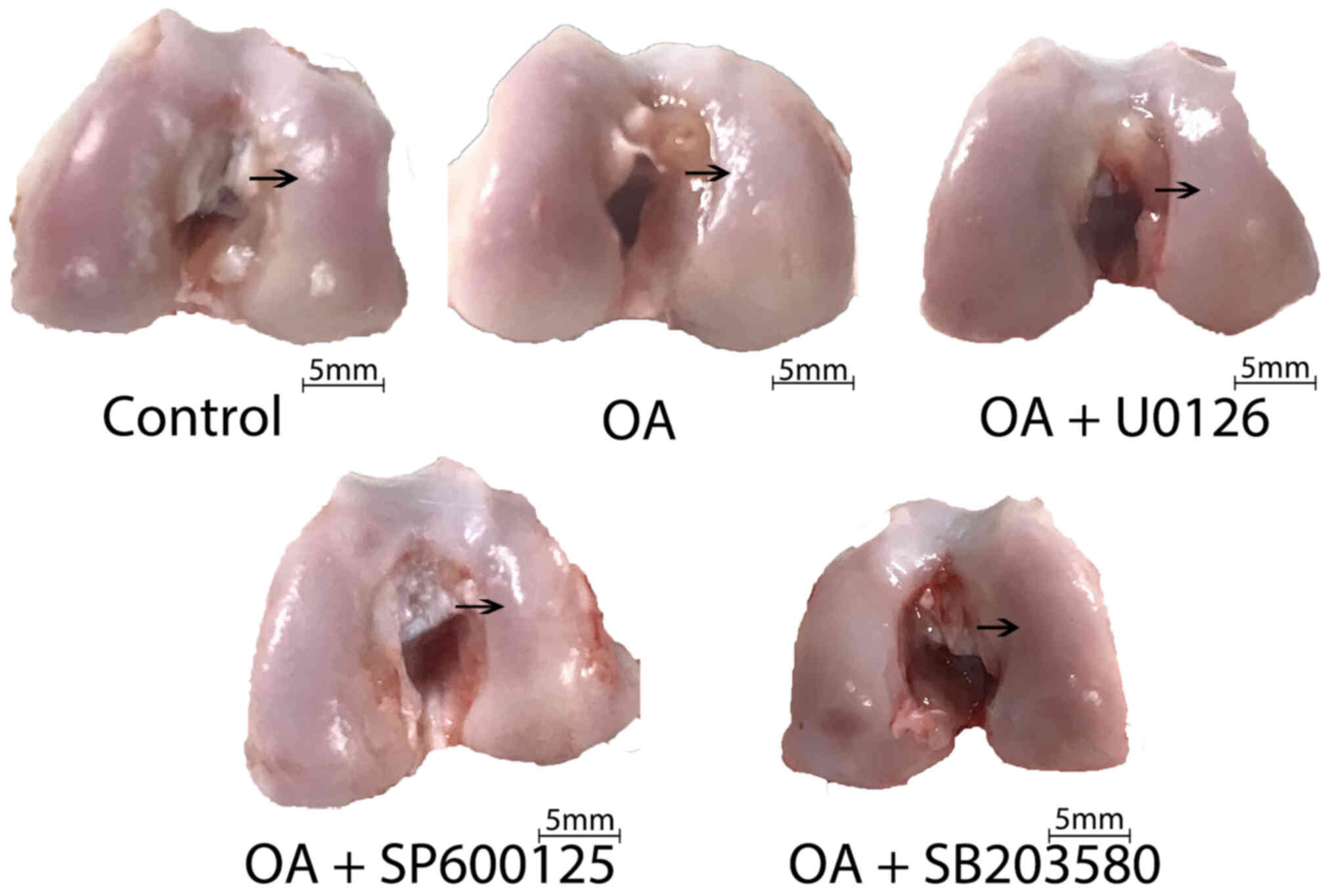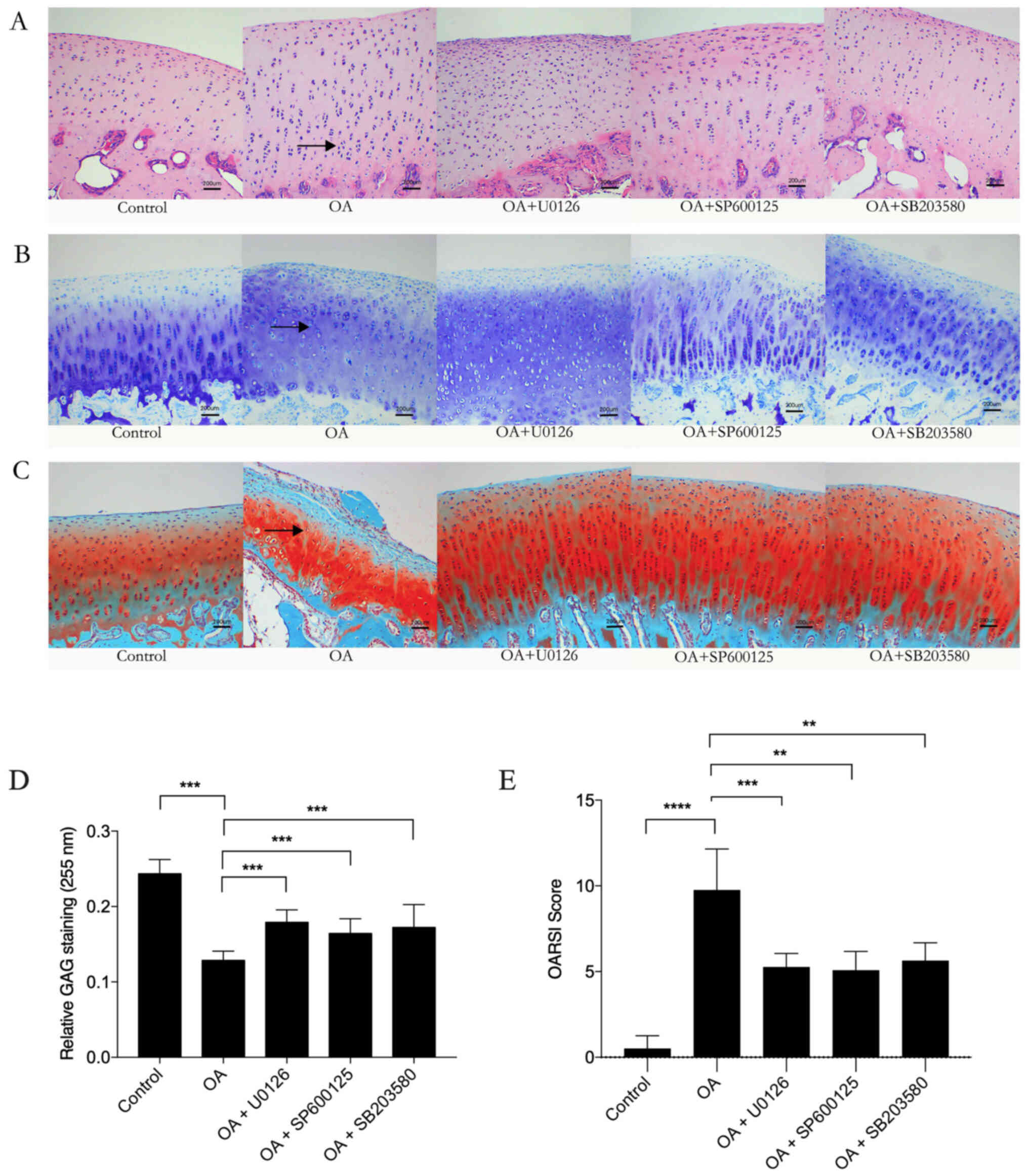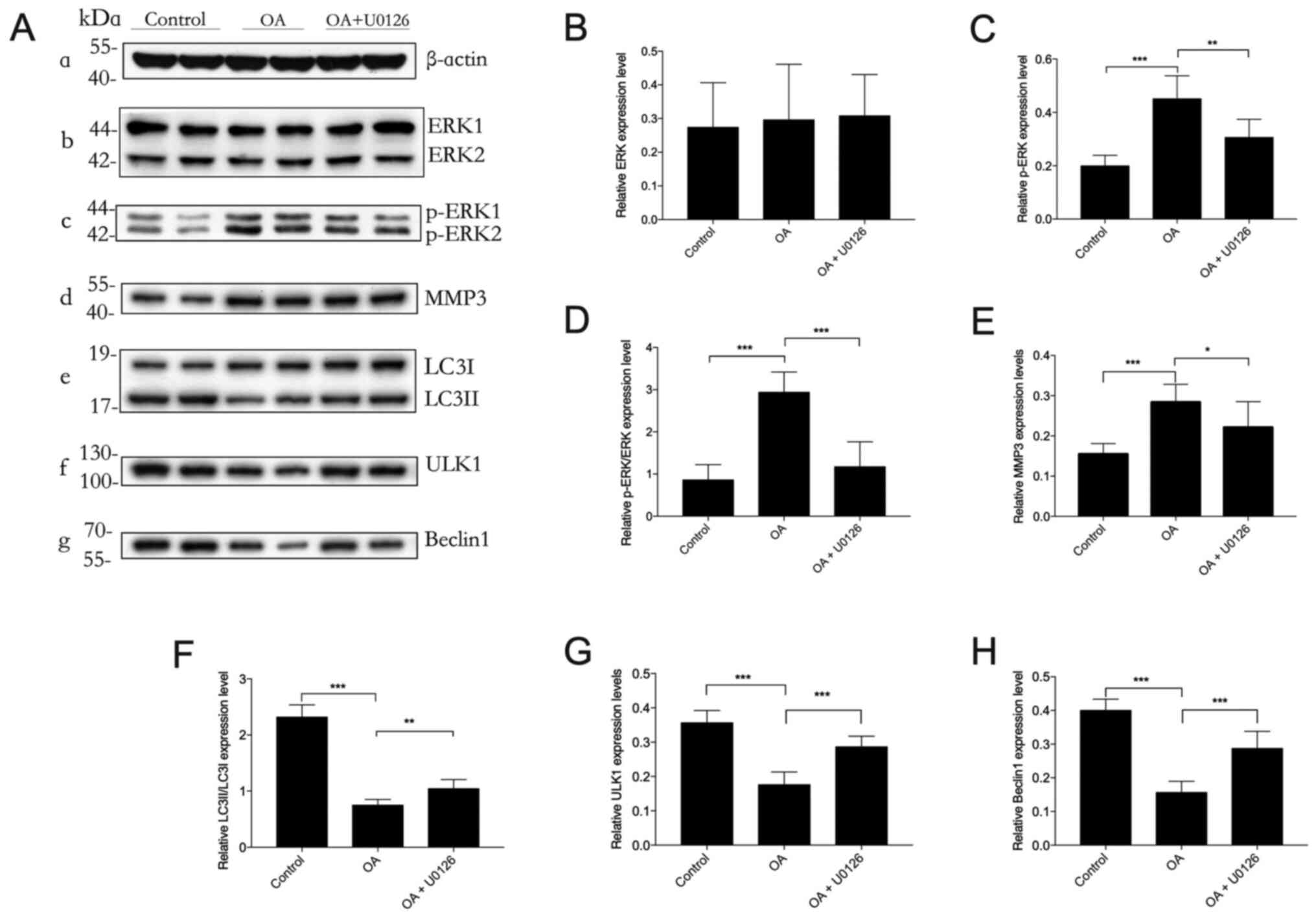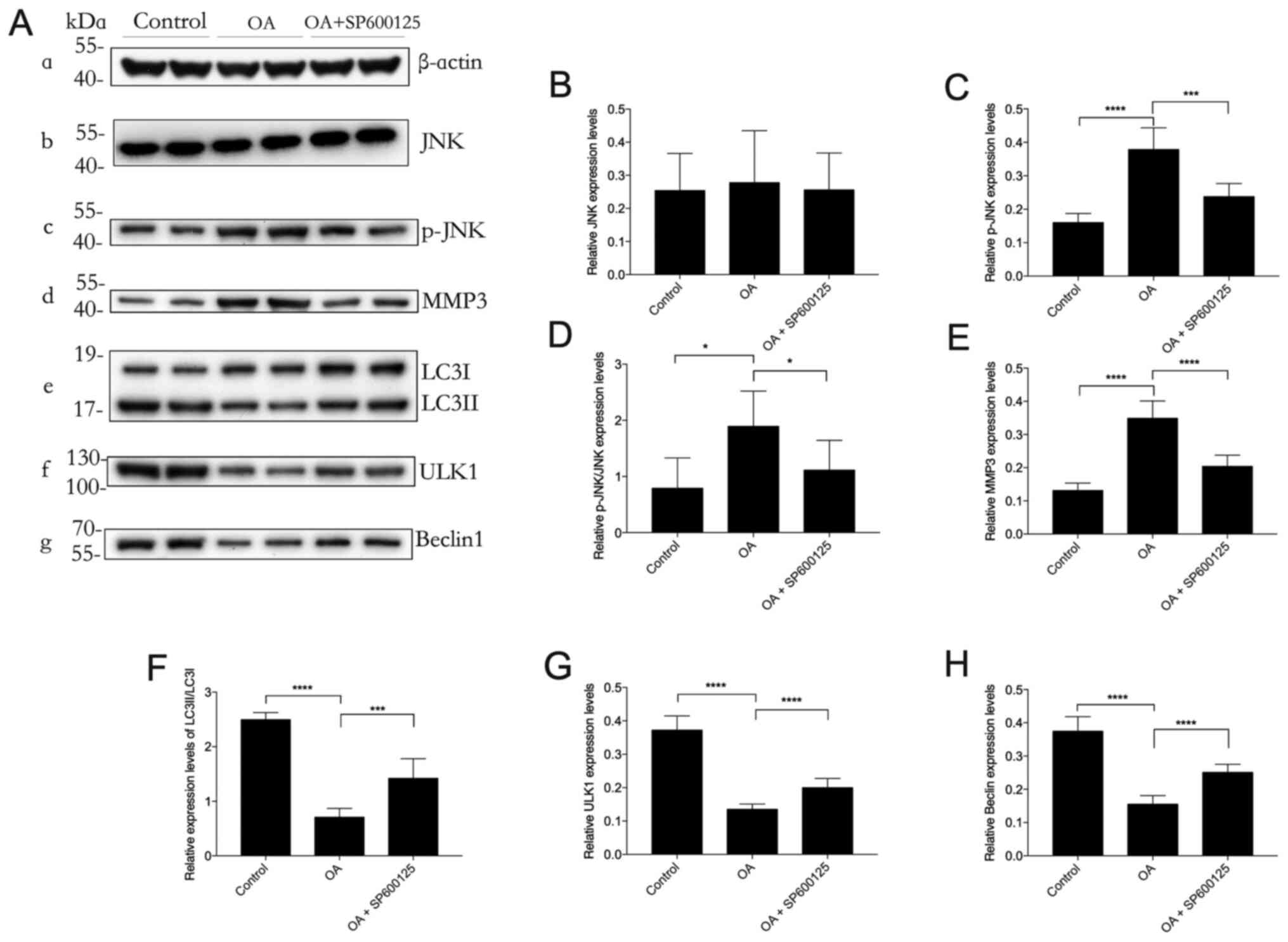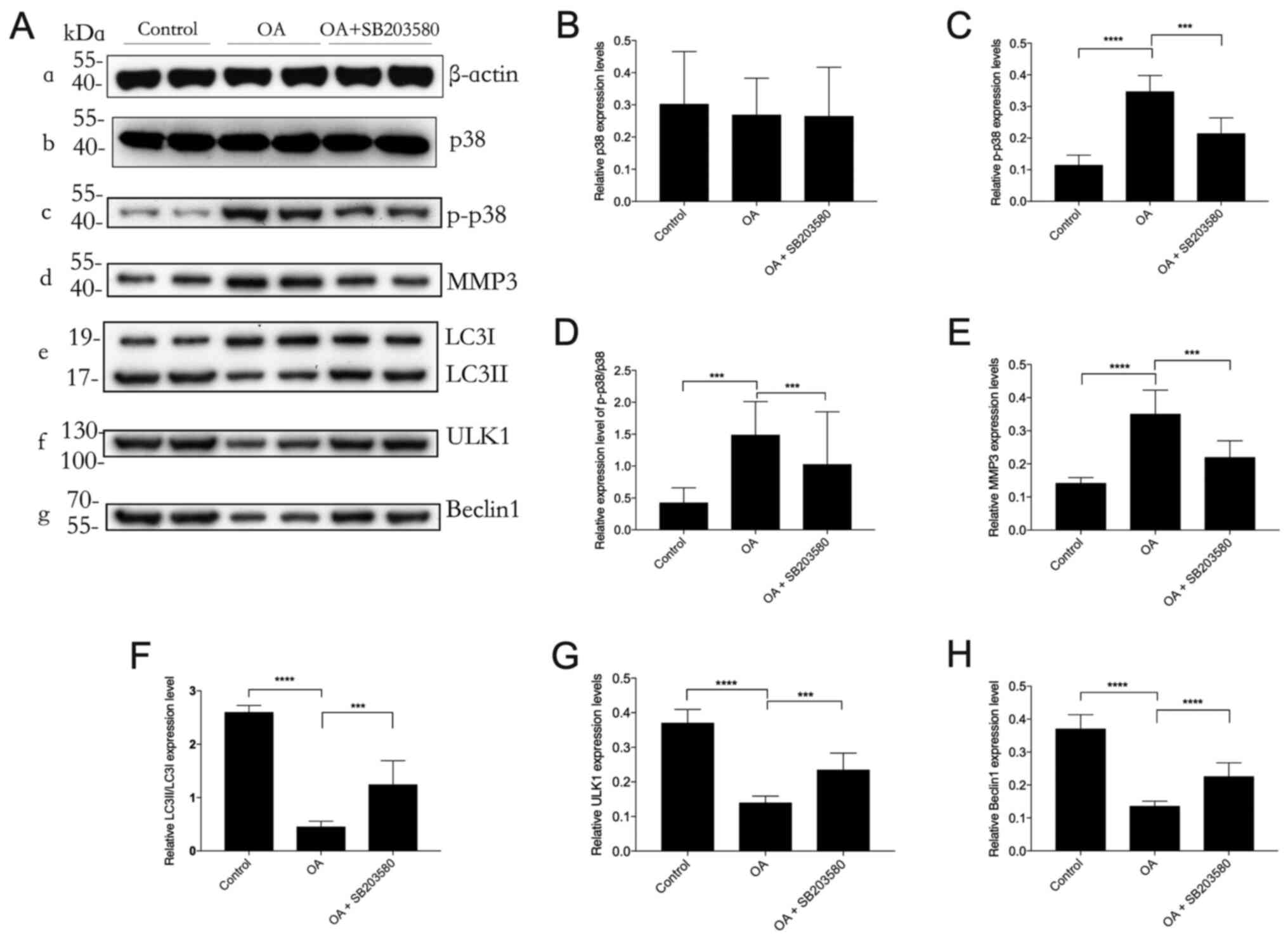|
1
|
Mathiessen A and Conaghan PG: Synovitis in
osteoarthritis: Current understanding with therapeutic
implications. Arthritis Res Ther. 19:182017. View Article : Google Scholar : PubMed/NCBI
|
|
2
|
Vila S: Inflammation in osteoarthritis. P
R Health Sci J. 36:123–129. 2017.PubMed/NCBI
|
|
3
|
Glyn-Jones S, Palmer AJ, Agricola R, Price
AJ, Vincent TL, Weinans H and Carr AJ: Osteoarthritis. Lancet.
386:376–387. 2015. View Article : Google Scholar : PubMed/NCBI
|
|
4
|
Vina ER and Kwoh CK: Epidemiology of
osteoarthritis: Literature update. Curr Opin Rheumatol. 30:160–167.
2018. View Article : Google Scholar : PubMed/NCBI
|
|
5
|
Saberi Hosnijeh F, Bierma-Zeinstra SM and
Bay-Jensen AC: Osteoarthritis year in review 2018: Biomarkers
(biochemical markers). Osteoarthritis Cartilage. 27:412–423. 2019.
View Article : Google Scholar : PubMed/NCBI
|
|
6
|
Hunt MA, Charlton JM and Esculier JF:
Osteoarthritis year in review 2019: Mechanics. Osteoarthritis
Cartilage. 28:267–274. 2020. View Article : Google Scholar : PubMed/NCBI
|
|
7
|
Kanwar JR, Samarasinghe RM, Kumar K, Arya
R, Sharma S, Zhou SF, Sasidharan S and Kanwar RK: Cissus
quadrangularis inhibits IL-1beta induced inflammatory responses on
chondrocytes and alleviates bone deterioration in osteotomized rats
via p38 MAPK signaling. Drug Des Devel Ther. 9:2927–2940. 2015.
View Article : Google Scholar : PubMed/NCBI
|
|
8
|
Bay-Jensen AC, Hoegh-Madsen S, Dam E,
Henriksen K, Sondergaard BC, Pastoureau P, Qvist P and Karsdal MA:
Which elements are involved in reversible and irreversible
cartilage degradation in osteoarthritis? Rheumatol Int. 30:435–442.
2010. View Article : Google Scholar : PubMed/NCBI
|
|
9
|
Saha S, Panigrahi DP, Patil S and Bhutia
SK: Autophagy in health and disease: A comprehensive review. Biomed
Pharmacother. 104:485–495. 2018. View Article : Google Scholar : PubMed/NCBI
|
|
10
|
Lapaquette P, Guzzo J, Bretillon L and
Bringer MA: Cellular and molecular connections between autophagy
and inflammation. Mediators Inflamm. 2015:3984832015. View Article : Google Scholar : PubMed/NCBI
|
|
11
|
Deretic V, Saitoh T and Akira S: Autophagy
in infection, inflammation and immunity. Nat Rev Immunol.
13:722–737. 2013. View
Article : Google Scholar : PubMed/NCBI
|
|
12
|
Mizushima N and Komatsu M: Autophagy:
Renovation of cells and tissues. Cell. 147:728–741. 2011.
View Article : Google Scholar : PubMed/NCBI
|
|
13
|
Levine B and Kroemer G: Biological
functions of autophagy genes: A disease perspective. Cell.
176:11–42. 2019. View Article : Google Scholar : PubMed/NCBI
|
|
14
|
Jeon H and Im GI: Autophagy in
osteoarthritis. Connect Tissue Res. 58:497–508. 2017. View Article : Google Scholar : PubMed/NCBI
|
|
15
|
Luo P, Gao F, Niu D, Sun X, Song Q, Guo C,
Liang Y and Sun W: The role of autophagy in chondrocyte metabolism
and osteoarthritis: A comprehensive research review. Biomed Res
Int. 2019:51716022019. View Article : Google Scholar : PubMed/NCBI
|
|
16
|
Carames B, Taniguchi N, Otsuki S, Blanco
FJ and Lotz M: Autophagy is a protective mechanism in normal
cartilage, and its aging-related loss is linked with cell death and
osteoarthritis. Arthritis Rheum. 62:791–801. 2010. View Article : Google Scholar : PubMed/NCBI
|
|
17
|
Filfan M, Sandu RE, Zavaleanu AD, GresiTa
A, Glavan DG, Olaru DG and Popa-Wagner A: Autophagy in aging and
disease. Rom J Morphol Embryol. 58:27–31. 2017.PubMed/NCBI
|
|
18
|
Shi J, Zhang C, Yi Z and Lan C: Explore
the variation of MMP3, JNK, p38 MAPKs, and autophagy at the early
stage of osteoarthritis. IUBMB Life. 68:293–302. 2016. View Article : Google Scholar : PubMed/NCBI
|
|
19
|
Guo YJ, Pan WW, Liu SB, Shen ZF, Xu Y and
Hu LL: ERK/MAPK signalling pathway and tumorigenesis. Exp Ther Med.
19:1997–2007. 2020.PubMed/NCBI
|
|
20
|
Plotnikov A, Zehorai E, Procaccia S and
Seger R: The MAPK cascades: Signaling components, nuclear roles and
mechanisms of nuclear translocation. Biochim Biophys Acta.
1813:1619–1633. 2011. View Article : Google Scholar : PubMed/NCBI
|
|
21
|
Xu K, Ma C, Xu L, Ran J, Jiang L, He Y,
Adel Abdo Moqbel S, Wang Z and Wu L: Polygalacic acid inhibits MMPs
expression and osteoarthritis via Wnt/beta-catenin and MAPK signal
pathways suppression. Int Immunopharmacol. 63:246–252. 2018.
View Article : Google Scholar : PubMed/NCBI
|
|
22
|
Kim EK and Choi EJ: Compromised MAPK
signaling in human diseases: An update. Arch Toxicol. 89:867–882.
2015. View Article : Google Scholar : PubMed/NCBI
|
|
23
|
Mei S, Gu H, Ward A, Yang X, Guo H, He K,
Liu Z and Cao W: p38 mitogen-activated protein kinase (MAPK)
promotes cholesterol ester accumulation in macrophages through
inhibition of macroautophagy. J Biol Chem. 287:11761–11768. 2012.
View Article : Google Scholar : PubMed/NCBI
|
|
24
|
Shen T, Miao Y, Ding C, Fan W, Liu S, Lv
Y, Gao X, De Boevre M, Yan L, Okoth S, et al: Activation of the
p38/MAPK pathway regulates autophagy in response to the
CYPOR-dependent oxidative stress induced by zearalenone in porcine
intestinal epithelial cells. Food Chem Toxicol. 131:1105272019.
View Article : Google Scholar : PubMed/NCBI
|
|
25
|
He Y, She H, Zhang T, Xu H, Cheng L, Yepes
M, Zhao Y and Mao Z: p38 MAPK inhibits autophagy and promotes
microglial inflammatory responses by phosphorylating ULK1. J Cell
Biol. 217:315–328. 2018. View Article : Google Scholar : PubMed/NCBI
|
|
26
|
Luo T, Zhang H, Yu Q, Liu G, Long M, Zhang
K, Liu W, Song R, Bian J, Gu J, et al: ERK1/2 MAPK promotes
autophagy to suppress ER stress-mediated apoptosis induced by
cadmium in rat proximal tubular cells. Toxicol In Vitro. 52:60–69.
2018. View Article : Google Scholar : PubMed/NCBI
|
|
27
|
Barutcu SA, Girnius N, Vernia S and Davis
RJ: Role of the MAPK/cJun NH2-terminal kinase signaling pathway in
starvation-induced autophagy. Autophagy. 14:1586–1595. 2018.
View Article : Google Scholar : PubMed/NCBI
|
|
28
|
Yan H, Gao Y and Zhang Y: Inhibition of
JNK suppresses autophagy and attenuates insulin resistance in a rat
model of nonalcoholic fatty liver disease. Mol Med Rep. 15:180–186.
2017. View Article : Google Scholar : PubMed/NCBI
|
|
29
|
He Q, Mei D, Sha S, Fan S, Wang L and Dong
M: ERK-dependent mTOR pathway is involved in berberine-induced
autophagy in hepatic steatosis. J Mol Endocrinol. 59:X12017.Erratum
for: J Mol Endocrinol 57: 251–260, 2016. View Article : Google Scholar : PubMed/NCBI
|
|
30
|
Sridharan S, Jain K and Basu A: Regulation
of autophagy by kinases. Cancers (Basel). 3:2630–2654. 2011.
View Article : Google Scholar : PubMed/NCBI
|
|
31
|
Webber JL and Tooze SA: Coordinated
regulation of autophagy by p38alpha MAPK through mAtg9 and p38IP.
EMBO J. 29:27–40. 2010. View Article : Google Scholar : PubMed/NCBI
|
|
32
|
Matsuzawa T, Fujiwara E and Washi Y:
Autophagy activation by interferon-γ via the p38 mitogen-activated
protein kinase signalling pathway is involved in macrophage
bactericidal activity. Immunology. 141:61–69. 2014. View Article : Google Scholar : PubMed/NCBI
|
|
33
|
Liu Y, Wang N, Zhang S and Liang Q:
Autophagy protects bone marrow mesenchymal stem cells from
palmitate-induced apoptosis through the ROS-JNK/p38 MAPK signaling
pathways. Mol Med Rep. 18:1485–1494. 2018.PubMed/NCBI
|
|
34
|
Zhu J, Yu W, Liu B, Wang Y, Shao J, Wang
J, Xia K, Liang C, Fang W, Zhou C and Tao H: Escin induces
Caspase-dependent apoptosis and autophagy through the ROS/p38 MAPK
signalling pathway in human osteosarcoma cells in vitro and in
vivo. Cell Death Dis. 8:e31132017. View Article : Google Scholar : PubMed/NCBI
|
|
35
|
NC3Rs Reporting Guidelines Working Group,
. Animal research: Reporting in vivo experiments: The ARRIVE
guidelines. J Physiol. 588:2519–2521. 2010. View Article : Google Scholar : PubMed/NCBI
|
|
36
|
National Research Council (US) Committee
for the Update of the Guide for the Care and Use of Laboratory
Animals, . Guide for the Care and Use of Laboratory Animals, 8th
edition. National Academies Press (US); Washington, DC: 2011
|
|
37
|
Sharma L: Osteoarthritis of the Knee. N
Engl J Med. 384:51–59. 2021. View Article : Google Scholar : PubMed/NCBI
|
|
38
|
Hu XB, Kang RR, Tang TT, Li YJ, Wu JY,
Wang JM, Liu XY and Xiang DX: Topical delivery of
3,5,4′-trimethoxy-trans-stilbene-loaded Microemulsion-based
hydrogel for the treatment of osteoarthritis in a rabbit model.
Drug Deliv Transl Res. 9:357–365. 2019. View Article : Google Scholar : PubMed/NCBI
|
|
39
|
Higashiguchi T and Go K: Effect of
neurotropin on experimental osteoarthritis. Nihon Yakurigaku
Zasshi. 96:153–1561. 1990.(In Japanese). View Article : Google Scholar : PubMed/NCBI
|
|
40
|
Pritzker KP, Gay S, Jimenez SA, Ostergaard
K, Pelletier JP, Revell PA, Salter D and van den Berg WB:
Osteoarthritis cartilage histopathology: Grading and staging.
Osteoarthritis Cartilage. 14:13–29. 2006. View Article : Google Scholar : PubMed/NCBI
|
|
41
|
van der Sluijs JA, Geesink RG, van der
Linden AJ, Bulstra SK, Kuyer R and Drukker J: The reliability of
the Mankin score for osteoarthritis. J Orthop Res. 10:58–61. 1992.
View Article : Google Scholar : PubMed/NCBI
|
|
42
|
Waldstein W, Perino G, Gilbert SL, Maher
SA, Windhager R and Boettner F: OARSI osteoarthritis cartilage
histopathology assessment system: A biomechanical evaluation in the
human knee. J Orthop Res. 34:135–140. 2016. View Article : Google Scholar : PubMed/NCBI
|
|
43
|
Dash S, Aydin Y and Moroz K:
Chaperone-Mediated autophagy in the liver: Good or Bad? Cells.
8:13082019. View Article : Google Scholar : PubMed/NCBI
|















